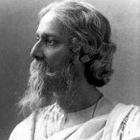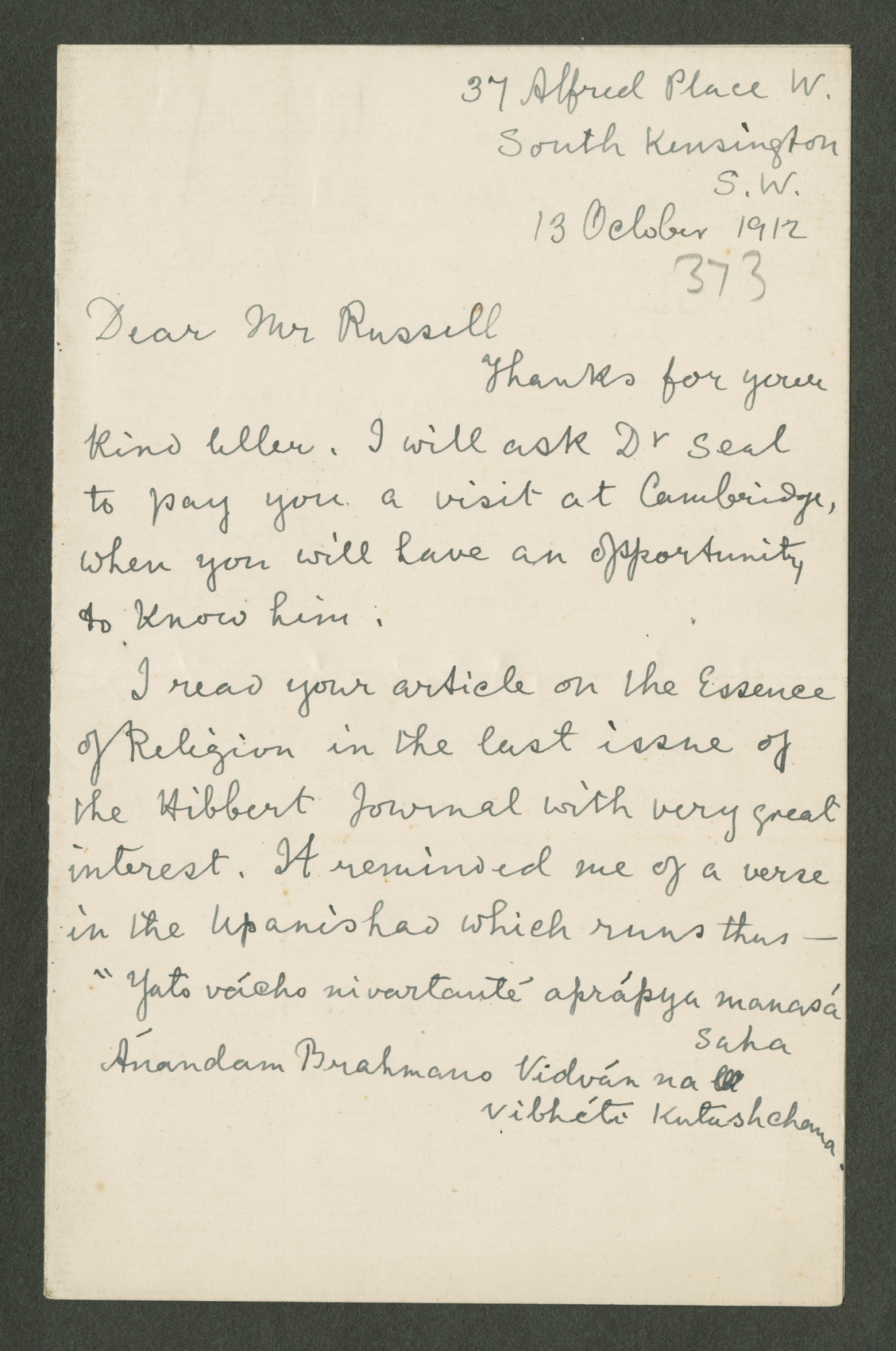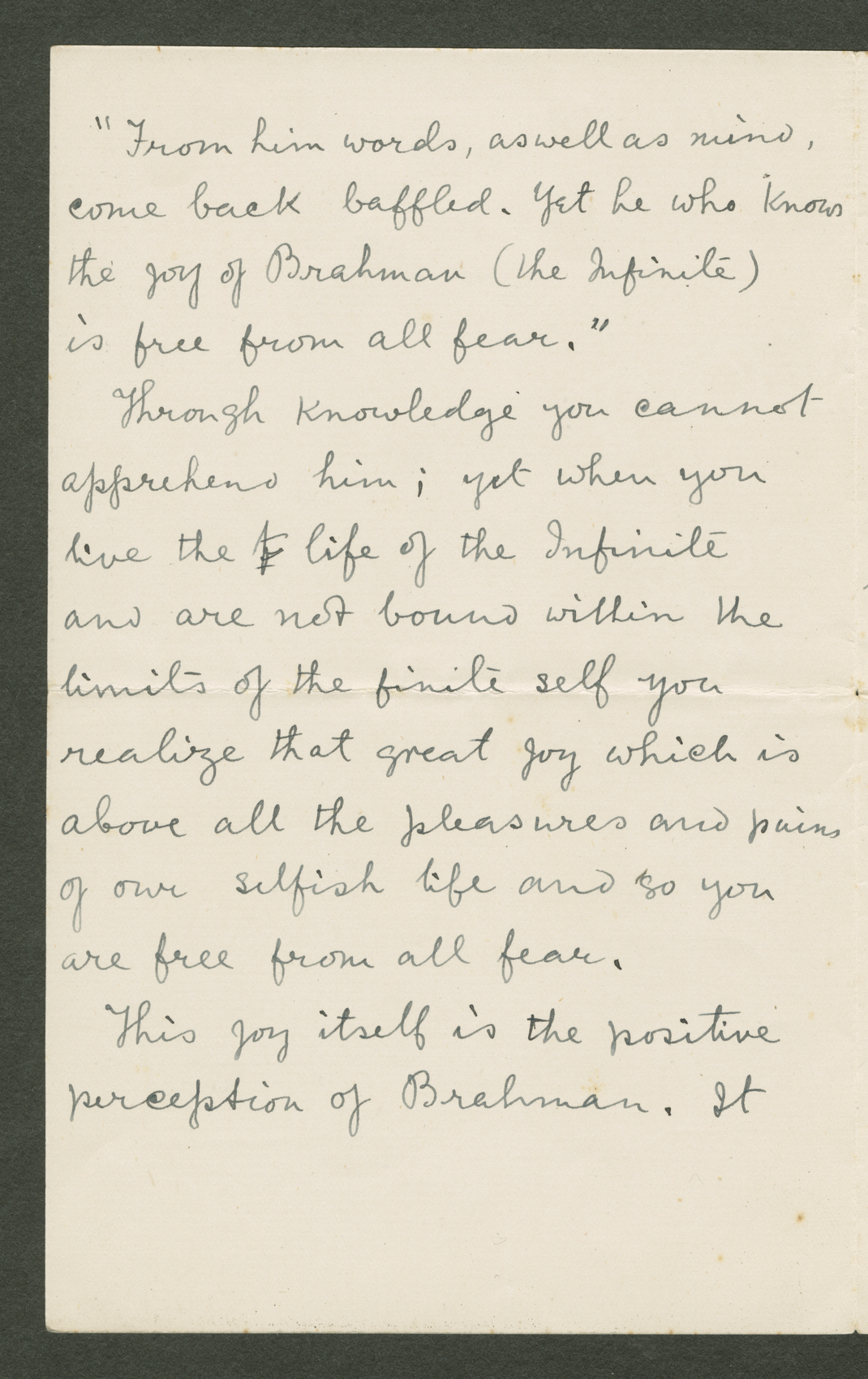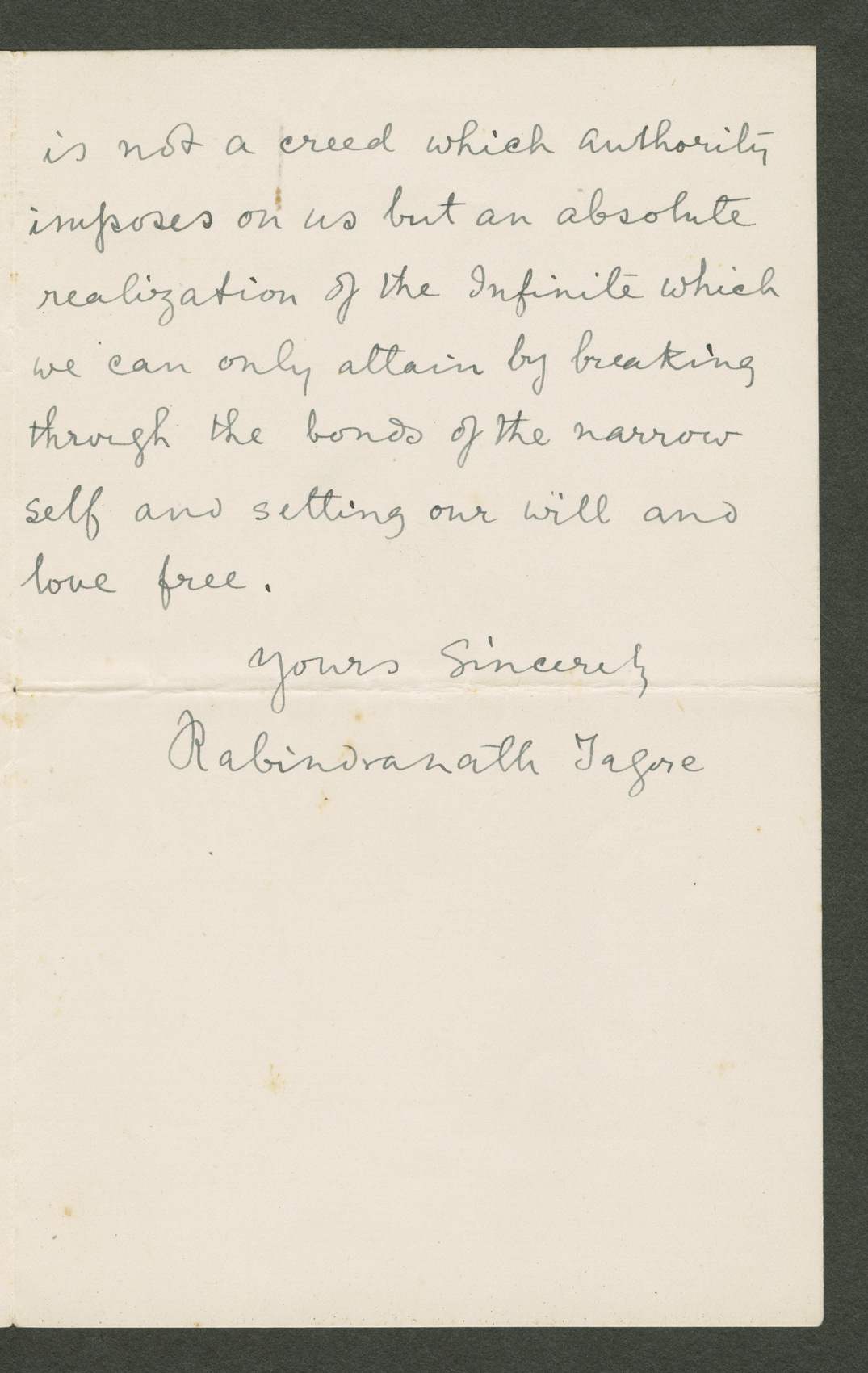“It reminded me of a verse in the Upanishad”
Rabindranath Tagore to Bertrand Russell
October 13, 1912

Bertrand Russell and the Bengali poet, Rabindranath Tagore (1861-1941), became acquainted while Tagore was visiting England in 1912. In this letter of October 13, Tagore tells Russell that he has just finished reading his article “The Essence of Religion” which had recently been published in The Hibbert Journal—the article, says Tagore, “reminded me of a verse in the Upanishad.”
“The Essence of Religion” was the result of an attempted collaboration between Russell and his lover, Ottoline Morrell, to write something on the subject of non-dogmatic religion. Russell’s student, Ludwig Wittgenstein, whom Russell greatly admired, was critical of the article. As Russell wrote to Ottoline on October 11: “Wittgenstein was really unhappy about my paper on religion. He felt I had been a traitor to the gospel of exactness, and wantonly used words vaguely; also that such things are too intimate for print. I minded very much, because I half agree with him.” Russell would later try to distance himself from the piece.
While Russell’s reply to Tagore’s letter is not available (we can assume it would have been a polite thank you), his private opinion of Tagore at that time is evident from a letter he wrote to Ottoline on June 19, 1913: “Here I am back from Tagore's lecture, after walking most of the way home. It was unmitigated rubbish – cut-and-dried conventional stuff about the river becoming one with the Ocean and man becoming one with Brahma. Everybody thought themselves so earnest and had a look of fat spiritual exaltation. The man is sincere and in earnest, but merely rattling old dry bones. I spoke to him before the lecture – afterwards I avoided him.”
A few months later, Tagore was awarded the Nobel Prize in Literature for “his profoundly sensitive, fresh and beautiful verse, by which, with consummate skill, he has made his poetic thought, expressed in his own English words, a part of the literature of the West."
In 1931 Russell wrote a positive tribute to Tagore that was included in The Golden Book of Tagore, a book commemorating Tagore’s 70th birthday. Among other things, he wrote: “He has contributed as much as any man living to the most important work of our time, namely, the promotion of understanding between different races.” Thirty years later, Russell’s view of Tagore was more muted. As the 1961 centenary of Tagore’s birth was approaching, several organizations contacted Russell to see if he would participate in commemorating this event. One such agency was the International Institute for Peace. Russell’s reply was typical of his replies to others: "I am sorry that I do not feel able to join in the celebrations of Tagore since, although I respected his work for peace, his general philosophy was very alien to my way of thinking and I should not wish to seem to agree with it."
Russell’s rejection did not deter the Asiatic Society from awarding him a Rabindranath Tagore Centenary Medal, given to eminent scholars in the humanities and the sciences. The British Council in India accepted the medal on Russell’s behalf—it is now part of the Bertrand Russell Archives.
Despite Russell’s feelings about Tagore, he saw fit to include a transcription of Tagore’s 1913 letter in his Autobiography.
Sources: (1) Letters from Bertrand Russell to Ottoline Morrell, 11 October 1912 and 19 June 1913, as found in Nicholas Griffin, ed. The Selected Letters of Bertrand Russell: The Private Years, 1884-1914. London and New York: Routledge, 2002. (2) A copy of Russell’s 1931 tribute to Tagore as published in The Golden Book of Tagore can be seen in the Russell Archives, RA 223. (3) Letter from Bertrand Russell to the International Institute for Peace, 16 August 1960, Bertrand Russell Archives, Box 11.16 RA 750. (4) Nobelprize.org. Nobel Media AB 2014. Web. 10 Feb 2018 http://www.nobelprize.org/nobel_prizes/literature/laureates/1913/
37 Alfred Place W.
South Kensington
S.W.
13 October 1912
Dear Mr Russell
Thanks for your kind letter. I will ask Dr. Seal to pay you a visit at Cambridge, when you will have an opportunity to know him. [1]
I read your article on the Essence of Religion in the last issue of the Hibbert Journal with very great interest.[2] It reminded me of a verse in the Upanishad which runs thus—
“Yato vácho nivartanté aprápya manasá saha
Ánandam Brahmans Vidván na vibhéto Kutushchama.
[second page]
“From him words, as well as mind, come back baffled. Yet he who knows the joy of Brahman (the Infinite) is free from all fear.”
Through knowledge you cannot apprehend him; yet when you have the life of the Infinite and are not bound within the limits of the finite self you realize that great Joy which is above all the pleasures and pains of our selfish life and so you are free from all fear.
This Joy itself is the positive perception of Brahman. It
[third page]
is not a creed which authority imposes on us but an absolute realization of the Infinite which we can only attain by breaking through the bonds of the narrow self and setting our will and love free.
Yours Sincerely
Rabindranath Tagore
[1] The letter from Russell to which Tagore refers is not available. However, it would have been a reply to Tagore’s letter of October 10 in which he asked Russell to meet Dr. Brajendra Nath Seal of the University of Calcutta who was visiting England.
[2] “The Essence of Religion” The Hibbert Journal II (October 1912): 46-62.
Bertrand Russell Archives, Box 5.49, Document 056788. Public domain in Canada. Copy provided for personal and research use only. For any other use, the user assumes all risk.


